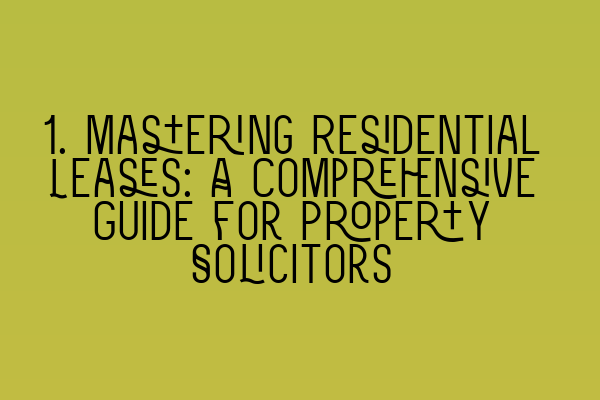Mastering Residential Leases: A Comprehensive Guide for Property Solicitors
Residential leases are a fundamental aspect of property law, and as a property solicitor, it is crucial to master the intricate details of this area. Whether you are a seasoned professional or just starting your legal career, this comprehensive guide will provide you with the knowledge and insights you need to navigate residential leases with ease.
Understanding Residential Leases
Before delving into the complexities of residential leases, it is important to understand what they entail. A residential lease is a legal document that outlines the rights and responsibilities of both the landlord and tenant in a rental agreement for a residential property. It establishes the terms of occupancy, rent payment, maintenance, and other essential aspects of the tenancy.
Residential leases can be either short-term or long-term, depending on the agreement between the parties involved. Short-term leases, often referred to as assured shorthold tenancies, typically last for a fixed period of six months to a year, while long-term leases can extend for several years or more.
Now that we’ve established the basics, let’s dive into the key elements that property solicitors need to master when dealing with residential leases.
Essential Elements of Residential Leases
1. Rent and Rent Review
The rent is a critical aspect of any lease agreement. As a property solicitor, you must ensure that the rent amount is clearly stated, along with any provisions for rent increases. It is important to understand the various methods of rent review, such as fixed percentage increases, market value assessments, or linked to the Consumer Price Index (CPI).
Understanding the rent review mechanisms enables you to negotiate fair rental terms and advise your clients on their rights and obligations regarding rent increases throughout the tenancy.
2. Repairs and Maintenance
Another crucial element of residential leases is the responsibility for repairs and maintenance. It is essential to clarify the obligations of both the landlord and tenant when it comes to maintaining the property in a reasonable state of repair.
As a property solicitor, you need to be well-versed in the legal requirements and limitations regarding repairs, including the landlord’s obligation to carry out certain repairs and the tenant’s responsibilities for minor maintenance tasks. Having a thorough understanding of these provisions will help you provide accurate advice to your clients and handle any disputes that may arise.
3. Termination and Renewal
One of the key aspects of residential leases is the termination and renewal process. Understanding the legal requirements and procedures for terminating a lease is essential to protect your clients’ interests.
As a property solicitor, you should be familiar with the various termination grounds, such as the expiry of the fixed term, the tenant’s breach of the agreement, or the mutual agreement between the parties. You should also be proficient in advising your clients on the renewal options available and the procedures involved in extending or terminating a lease.
4. Assignment and Subletting
Assignment and subletting provisions in residential leases can significantly impact both landlords and tenants. It is important to grasp the complexities of these provisions to safeguard your clients’ rights and interests.
As a property solicitor, you should be able to advise your clients on the conditions and restrictions associated with assigning or subletting the property. This includes understanding the tenant’s right to assign or sublet, obtaining the landlord’s consent, and drafting appropriate clauses within the lease agreement to address these issues.
5. Breach of Lease
When breaches of lease occur, it is essential for property solicitors to guide their clients on the appropriate legal remedies and actions. Familiarize yourself with the breach of lease provisions, such as non-payment of rent, unapproved alterations, or unauthorized pets.
By understanding the legal implications of lease breaches, you can effectively advise your clients on potential courses of action, such as serving notice, seeking legal remedies, or negotiating a resolution between the parties.
Staying on Top of Changes in Property Law
As a property solicitor, it is crucial to stay updated with the latest developments and changes in property law. The legal landscape is constantly evolving, and being aware of new legislation and case law is essential to provide accurate and up-to-date advice to your clients.
Continuing professional development (CPD) courses and resources are essential tools to enhance your knowledge and keep abreast of the latest changes in property law. Platforms like SQE Property Law & Land Law offer comprehensive SQE 1 and SQE 2 preparation courses that can help you stay ahead in this competitive field.
To further enhance your skills and knowledge, consider taking advantage of SQE 1 Practice Exam Questions and SQE 1 Practice Mocks FLK1 FLK2 to hone your understanding of residential leases and other property law concepts.
Remember, achieving mastery in residential leases requires a commitment to continuous learning and staying up-to-date with developments in property law.
Conclusion
Mastering residential leases is essential for property solicitors to provide effective and comprehensive legal advice to their clients. By understanding the essential elements of residential leases, staying updated with changes in property law, and investing in your professional development, you can become a trusted expert in this field.
For more information on SQE 1 and SQE 2 preparation courses, SRA SQE exam dates, and other helpful resources, visit the following links:
- SQE 1 Practice Exam Questions
- SQE 1 Practice Mocks FLK1 FLK2
- SQE 2 Preparation Courses
- SQE 1 Preparation Courses
- SRA SQE Exam Dates
Equip yourself with the necessary knowledge and resources, and become a residential leases expert that clients can rely on.
